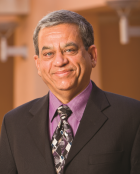Abhaya K. Datye
University of New Mexico, Albuquerque
Distinguished Regents' Professor and Chair
Department of Chemical and Biological Engineering and Center for Micro-Engineered Materials
Wednesday, March 11, 2020
Atom Trapping: Key to the Design of Thermally Stable and Regenerable Single Atom Catalysts
Heterogeneous catalysts represent the mainstay of the chemical industry, and a large majority involve nanoparticles on a support. Decreasing size of the nanoparticles leads to better utilization of the precious metals, with the highest atom efficiency being achieved when the metal is atomically dispersed in the form of isolated atoms. Isolated atoms become mobile at elevated temperatures, causing agglomeration into nanoparticles. Our research is focused on developing methods to control the growth of particle size and the transformation of nanoparticles into isolated single atoms [1-3].
Supports differ in their ability to maintain small particles. The figure below shows STEM images of three catalysts that contain 1 wt% Pt synthesized using the same amine precursor. The catalysts were all calcined at 500 °C in air to decompose the precursor. It is evident that very different sized Pt particles are formed. The ceria support contains isolated Pt atoms, the alumina support shows sub-nanometer sized particles while the MgAl2O4 support shows larger particles. The conventional term used to describe these differences is metal-support interactions (MSI), which is meant to suggest bonding of the metal nanoparticle with the oxide support. But the term MSI fails to capture the underlying mechanism that leads to these observations.
We have characterized these differences in catalyst supports in terms of their ability to trap atoms. We learnt that ceria supports help generate a stable and fully regenerable Pt catalyst that can change reversibly from single atoms into metallic nanoparticles [3]. The understanding of atom trapping derived from ceria supports can be translated to other oxide supports. This will impact not only automotive exhaust treatment (where catalysts are exposed to high temperature) but also other industrial reactions such as propane dehydrogenation or methane oxidation, where high temperatures are required. The presentation will focus on the understanding of atom trapping and its application for design of thermally stable and regenerable catalysts.
Bio
Abhaya Datye has been on the faculty at the University of New Mexico since 1984 after receiving his Ph.D. in chemical engineering from the University of Michigan, working with Johannes Schwank. He has authored 247 publications, 7 patents and has presented 166 invited lectures around the world. His published work has received ~16,672 citations with an h-index of 67 (Google Scholar). He is a fellow of the AIChE, the Microscopy Society of America and the Royal Society of Chemistry. He has been actively involved in the North American Catalysis Society, serving as co-chair for the Denver NAM 2017, program co-chair for the Snowbird NAM 1995 and Vice Chair for the ICC 2020. He was the Chair of the Gordon Research Conference on Catalysis in 2010.
His research group has pioneered the development of electron microscopy tools for the study of catalysts. His current work involves fundamental studies of catalyst sintering, especially the stabilization of isolated single atoms on supports for high temperature catalytic applications such as exhaust catalysis and alkane dehydrogenation. His research has been recognized through numerous awards, including the Robert L. Burwell Lectureship of the North American Catalysis Society (2019), the Walter J Weber Distinguished Lectureship form the University of Michigan Chemical Engineering (2019), the John Matthews Lectureship from the Microscopy Society of South Africa (2012), The 2008 Award for Excellence from the NSF IUCRC program, In 2016, the ACS publication Chemical & Engineering News included his research on single atom catalysis as one of the top 10 stories for the year.
Wednesday, March 11, 2020
- Time: 11:00 AM
- Location: 206 Furnas Hall
- Seminar Flyer

Distinguished Regents' Professor and Chair
University of New Mexico, Albuquerque